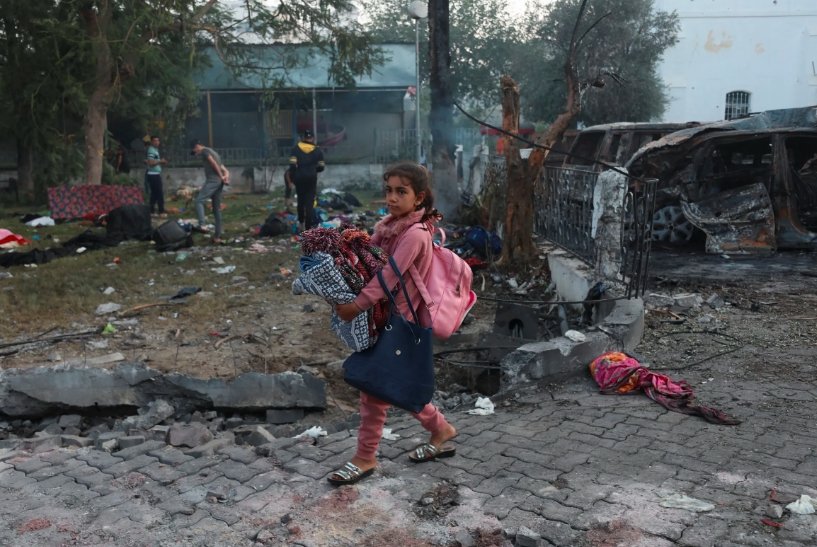Ehud Barak compares Gaza conflict to past invasions of Afghanistan, Iraq and Lebanon
Former Israeli prime minister Ehud Barak has spoken recently online to an American think tank about the latest round of violence between Israel and Hamas in Gaza. He warned that the conflict could escalate into a regional war involving major powers and have grave consequences for all parties involved.
Barak, who is also the most highly decorated soldier in Israel’s history, said that the current situation reminded him of three previous invasions that were provoked by acts of terrorism but ended up being strategic blunders: Israel’s invasion of Lebanon in 1982, America’s invasion of Afghanistan in 2001 and of Iraq in 2003.
He argued that these invasions did irreversible damage to the invading powers and also set back the interests of the people in the invaded countries. He urged caution and diplomacy to avoid repeating the same mistakes in Gaza.
Biden stumbles through his response during his visit to Israel
US president Joe Biden, who is visiting Israel amid the Gaza crisis, has faced criticism for his choice of words and his lack of action. He referred to the devastating explosion at the Al-Ahli hospital in Gaza on Tuesday that killed hundreds of Palestinians as “done by the other team”, which was seen as flippant and insensitive.

Biden also failed to call for an immediate ceasefire or to condemn Israel’s disproportionate use of force against civilians in Gaza. He reiterated his support for Israel’s right to defend itself, but did not mention the rights of the Palestinians.
Biden’s response has been contrasted with that of his predecessor Donald Trump, who was more vocal and decisive in his backing of Israel. Some analysts have suggested that Biden is trying to balance his domestic and international pressures, but is risking losing credibility and influence in the region.
Egypt rejects pressure to open its borders with Gaza
Egypt, which shares a border with Gaza, has been under pressure from Western countries to open its borders and allow humanitarian aid and refugees to enter. However, Egypt has refused to do so, citing security and political reasons.
Egypt considers Hamas, which rules Gaza, as a terrorist organization and an ally of its rival, the Muslim Brotherhood. Egypt also fears that opening its borders would create a humanitarian crisis and destabilize its Sinai Peninsula, which is already plagued by insurgency and violence.
Egypt has told its Western counterparts that they should take responsibility for the refugees themselves if they care so much about human rights. Egypt has also accused them of hypocrisy and double standards for not doing enough to stop Israel’s aggression.
West Bank protesters call for the fall of Palestinian Authority president
In the West Bank, which is controlled by the Palestinian Authority (PA), there have been protests against PA president Mahmoud Abbas, who is seen as ineffective and corrupt. The protesters have accused him of being a lackey of Israel and of failing to support the resistance in Gaza.
The protesters have used the slogan “the people want the fall of the president”, which echoes the Arab Spring uprisings that toppled several authoritarian regimes in 2010-12. The protests have been met with repression and violence by the PA security forces, which have been trained and funded by the US and Israel.
The unrest in the West Bank has raised concerns about the stability and legitimacy of the PA, which is supposed to be a partner for peace with Israel. It has also exposed the deep divisions and rivalries among the Palestinian factions, especially between Abbas’s Fatah party and Hamas.
Hezbollah threatens to join the war in Gaza from Lebanon
Hezbollah, the Lebanese Shia militant group that is backed by Iran, has warned that it could join the war in Gaza and attack Israel with its massive arsenal of rockets. Hezbollah has close ties with Hamas and considers Israel as its enemy.
Hezbollah has an estimated 130,000 missiles, including some precision-guided weapons, that can reach any part of Israel. It also has thousands of fighters who have gained experience and training from fighting in Syria, Iraq and Yemen alongside Iran’s Islamic Revolutionary Guards Corps (IRGC).
Hezbollah’s involvement in the Gaza conflict would pose a serious challenge for Israel’s military and security. It would also increase the risk of a wider regional war involving Iran and its proxies on one side, and Israel and its allies on the other.


















